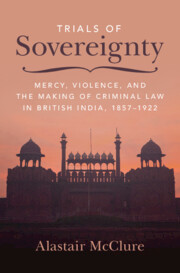Book contents
- Trials of Sovereignty
- Studies in Legal History
- Trials of Sovereignty
- Copyright page
- Dedication
- Contents
- Figures and Table
- Acknowledgments
- Abbreviations
- Introduction
- 1 Forgetting War and Punishing Crime
- 2 The Peace: The Queen’s Proclamation and the Politics of Forgiveness
- 3 The Code: Judges, Juries, and Punishing Difference
- 4 Discretion, the Death Penalty, and the Criminal Trial
- 5 Pardons and Scaffolds
- 6 Tilak’s Radical Innocence: Mercy, Sedition, and the State Trial
- 7 Gandhi’s Guilt and the Return of War
- Conclusion
- Epilogue
- Select Bibliography
- Index
- Studies in Legal History
Introduction
Published online by Cambridge University Press: 20 November 2024
- Trials of Sovereignty
- Studies in Legal History
- Trials of Sovereignty
- Copyright page
- Dedication
- Contents
- Figures and Table
- Acknowledgments
- Abbreviations
- Introduction
- 1 Forgetting War and Punishing Crime
- 2 The Peace: The Queen’s Proclamation and the Politics of Forgiveness
- 3 The Code: Judges, Juries, and Punishing Difference
- 4 Discretion, the Death Penalty, and the Criminal Trial
- 5 Pardons and Scaffolds
- 6 Tilak’s Radical Innocence: Mercy, Sedition, and the State Trial
- 7 Gandhi’s Guilt and the Return of War
- Conclusion
- Epilogue
- Select Bibliography
- Index
- Studies in Legal History
Summary
Chapter One examines the historical and legal context that resulted in the abolition of the East India Company and the formal transfer of political sovereignty from the Mughal state to the British Crown. It focuses on the Uprising of 1857 and is arranged around two questions: How did the colonial state attempt to erase the memory of Mughal sovereignty and the popular character of the violence enacted in its name, and what role did mercy play in this story? The chapter positions the trial and punishment of Bahadur Shah Zafar II as a founding trial of colonial sovereignty which exposed both the extraordinary violence and the absolute limits of colonial sovereign power. A former sovereign would be transformed into a criminal and brought within the British imperial order, but for the sake of the future legitimacy of this political project, he could not be killed.
- Type
- Chapter
- Information
- Trials of SovereigntyMercy, Violence, and the Making of Criminal Law in British India, 1857–1922, pp. 1 - 31Publisher: Cambridge University PressPrint publication year: 2024

